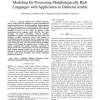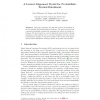723 search results - page 14 / 145 » Modelling Lexical Stress |
SIGDIAL
2010
13 years 7 months ago
2010
Temporal analysis of events is a central problem in computational models of discourse. However, correctly recognizing temporal aspects of events poses serious challenges. This pap...
TASLP
2008
13 years 9 months ago
2008
Language modeling for an inflected language such as Arabic poses new challenges for speech recognition and machine translation due to its rich morphology. Rich morphology results i...
MLCW
2005
Springer
14 years 3 months ago
2005
Springer
This paper describes the Bar-Ilan system participating in the Recognising Textual Entailment Challenge. The paper proposes first a general probabilistic setting that formalizes th...
ACL
2010
13 years 7 months ago
2010
Lexicalized reordering models play a crucial role in phrase-based translation systems. They are usually learned from the word-aligned bilingual corpus by examining the reordering ...
ICCS
2007
Springer
14 years 3 months ago
2007
Springer
Abstract. Frames, i.e., recursive attribute-value structures, are a general format for the decomposition of lexical concepts. Attributes assign unique values to objects and thus de...


